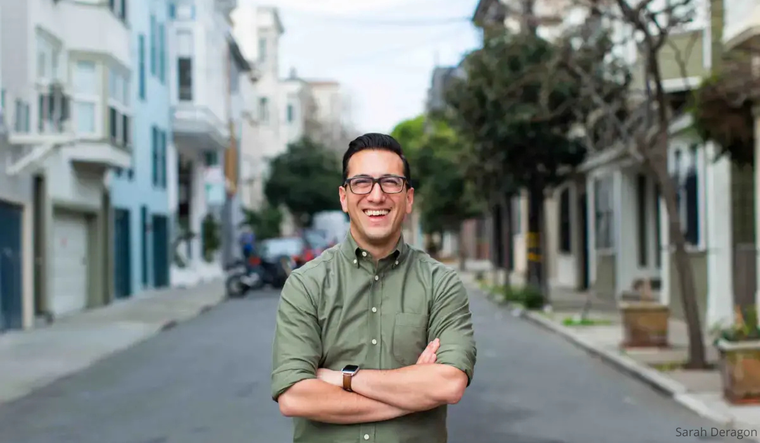Right Now Life Is Hard for Millions—Yet Bestselling Author Neil Pasricha Believes Even If You're Struggling, You Can Still Find Joy and Light
Before we get to the good news—and there is good news!—here's the tough stuff: So many of us are hurting. We’re seeing unprecedented rates of anxiety, depression, and suicide, and loneliness is forecasted as the next big epidemic. Humanity is in pain, and the irony, Neil Pasricha points out, is that we’re surrounded by abundance unlike ever before. “We live like kings, but none of us are happy,” says the bestselling author, who believes the constant negative news feed is suffocating us. “According to social media, the world is constantly ending.”
Here’s the good news: We can find the light—and Pasricha has provided a beacon for doing so with his new book Our Book of Awesome: A Celebration of the Small Joys that Bring Us Together. A “dart trying to pop the negativity bubble,” as Pasricha describes it, Our Book of Awesome is a guide for refocusing on the simple, accessible joys that surround all of us: watching people dance; snorting while laughing; drinking from the hose. The book includes hundreds of overlooked and underappreciated moments woven with positive anecdotes from people around the world.
At its core, Our Book of Awesome underscores our need for connection and empathy. It’s extended from Pasricha’s personal mission to lift himself out of hard times. (He started blogging about this more than a decade ago, which resulted in his wildly popular blog and subsequent books). Pasricha’s belief, which he walks us through here, is that in the face of all the media-fed negativity, we still have a choice to look to the joy—and we do this by seeing the beauty in the tiniest of moments. “The spirit of Our Book of Awesome is to congeal this community of people around the world and celebrate the simplest, smallest pleasures that make life great.”
A Conversation with Neil Pasricha
Neil, you say that “we get to decide” when it comes to how we think and if we wake up and will be put in a good mood. How does your book encourage this?
This is the model I was taught: If you do great work, then you have big success, and then you will be happy. Everyone thinks this. But It's wrong. It doesn't work like that. The model goes the opposite way. We must train our brains to be happy first, thinking of happiness as a habit or a practice.
The Harvard Study of Adult Development has shown that the number one driver of our long-term happiness is community connection. The reason it's called Our Book of Awesome is because I've tried to create the sound and feel of a community of people around you in practice.
What are some practices to help train our brain toward happiness and joy?
Number one: My two-minute morning practice.
When you wake up in the morning, I don't want your cell phone near you. That appears to be a community but it's not. Put your phone out of the bedroom. You might need to buy an alarm clock, which, don't worry, is only $5 at Walmart. So when you wake up [without a phone], you’re not going to know what to do. What I recommend next is for you to write down three things, each of which is backed by research:
I will let go of…
I am grateful for…
I will focus on…
For instance, I will let go of… the text I sent to my sister that I regret. I will let go of the fact that I didn't get to say goodbye to my dad. I will let go of the fact that we tried to have children for six years and we’ve had four miscarriages and we gave up. These are real examples people sent to me.
Next, I am grateful for—and this is where you can introduce some community. I am grateful for… the fact that my grandma likes it when I call. I'm grateful for the fact that the rescue puppy we got during the pandemic stopped peeing on my sheets. I'm grateful for the fact that I completely nailed the timing on that avocado.
Then, I will focus on—and again, here's an opportunity for connection. I will focus… on spending 15 minutes with the child that I don't have custody of but I haven't FaceTimed in a while. I will focus on going for a walk to the library. That's connection, that's community. I will focus on taking the bus to the other side of town to have coffee with my uncle.
Number two: Rose, Rose, Thorn
You don't need much time to play this. You can do it at dinner. Everyone goes around the table and says a rose from their day—there’s a new donut at the coffee shop; we made it to Montana without getting car sick; we saw an elk on the side of the road. Whatever it is, you just go around saying a rose, a positive thing from your day. You do that again for another rose, and then you each say a thorn, which is one thing that did not go well. You can vent and everyone must listen. No one is endlessly positive. Then you each say a bud, which is something you're looking forward to—I can't wait to have pancakes on Saturday with my mom; I can't wait to rent a villa in Tuscany when I'm 100. It can be anything, a dream of something to come. This game is simple. What happens when you play it, is you focus and you see how powerful the practice is.
Both of these practices take two minutes and what they do is prime your brain for positivity.
What has focusing on the small joys shown you?
The things that most of us wait for are the wide eyes and graduation stages: The father-daughter dances at weddings. The healthy baby screeching in delivery rooms. But those only add up to 10 days of your whole life. The average lifespan is 30,000 days. If you want to fill the other 29,990 days of your life with joy, pleasure, with positivity, what you need to practice is the ability to see the little things as special: Watching cream go into the coffee. Making it from the sink to the freezer without spilling the ice cube tray. When the cake plops flawlessly out of the pan. It all feels great.
You’ve been writing about intentional living for nearly 15 years, and your first book, The Book of Awesome, came out in 2010. What has surprised you as you continue to explore this topic?
When The Book of Awesome came out, everybody said, ‘this is what everybody needs right now,’ because we've had the financial crisis, the housing crisis, and the stock market crashing. Here I am coming back at it and if anything, things feel worse. I don't know if they actually are worse or if it just feels like they are. One of the top news stories this week was how TikTok is driving more children to suicide. So sometimes I feel depressed as I try so hard to put out these positive vibes and we have children taking their own lives. It makes me so sad. On the other hand, I ultimately believe in our human capacity. I interviewed Brian Stevenson recently he said the arc of history always bends toward justice. Well, the arc of history, I believe, bends toward positivity. We live better than we ever have lived before. According to [researchers] Emmons and McCullough, if you write down even five things you’re grateful for—I call them ‘awesome things’—a week, you're not only happier but will be physically healthier over a 10-week period. So what surprises me is how powerful this can be.
Neil Pasricha is the New York Times bestselling author of seven books, including The Book of Awesome and The Happiness Equation. He also hosts the award-winning podcast 3 Books and he gives more than fifty speeches a year, appearing for audiences at places such as Harvard and SXSW. Learn more and subscribe at @NeilPasricha and Neil.blog, and order Our Book of Awesome here.
Question from the Editor: What is a rose that you can celebrate today? We’d love to know in the comments below!
Please note that we may receive affiliate commissions from the sales of linked products.



